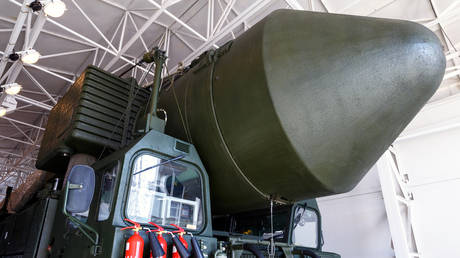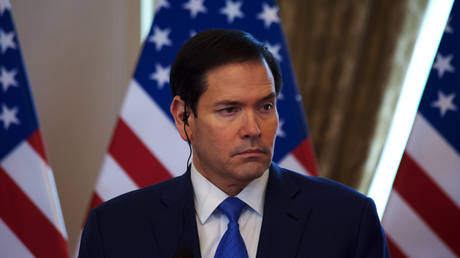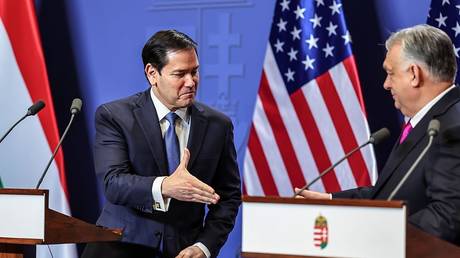
The new US arms control czar has laid out Washington’s thinking on the last remaining nuclear pact with Russia, hoping that US threats of a new arms race will force Moscow and Beijing to negotiate a new three-way deal instead.
“We intend to establish a new arms control regime now, precisely to prevent a full-blown arms race,” Ambassador Marshall Billingslea, special presidential envoy for arms control, said Thursday during a half-hour interview hosted by the Hudson Institute, a DC-based think tank.
In case there is an arms race, he added, US President Donald Trump “has made clear that we have a tried and true practice here. We know how to win these races and we know how to spend the adversary into oblivion.”
This claim is based on the conventional wisdom in Washington that the US “won” the Cold War by pouring money into weapons and forcing the Soviet Union to do the same, eventually causing an economic crisis that triggered the collapse of the socialist system. It is not a standpoint widely accepted in Russia, however.
Billingslea was freshly appointed to the role, having previously been in charge of combating “terrorist financing” at the Treasury Department. He has already discussed starting negotiations with Russian Deputy Foreign Minister Sergey Ryabkov “as soon as possible.” However, while Moscow would like to extend the 2002 New Start treaty – set to expire in February 2021 – Billingslea seems uninterested, preferring instead a completely new “trilateral agreement” that would include China as well.
Speaking on Thursday, Billingslea made clear that the US expects Russia to “bring China to the negotiating table,” hinting that Moscow might do so because it is itself concerned about Beijing’s behavior. China, in his telling, might agree because it wants to be “afforded great power status” and the US is “ready to afford them that respect.” The fact that Beijing has said “not interested” a number of times doesn’t seem to bother Washington.
Throughout the interview, Billingslea proceeded from premises widely shared in Washington: that Russia has violated every treaty ever and that its nuclear doctrine envisions nuclear escalation, among others. The US has never provided any evidence for any of these claims, but continues to assert them as true nonetheless.
This assertion is even baked into the current US nuclear posture review, published in February 2018, which significantly expands Washington’s willingness to employ nuclear weapons in case of conflict. However, it is in fact the US doctrine that believes using atomic weapons “could create conditions for decisive results and the restoration of strategic stability,” per a document published by the Joint Chiefs of Staff in June 2019, and hastily recalled from public view afterward.
Billingslea’s claim that the US is merely modernizing its nuclear arsenal, while Russia and China were expanding theirs, does not not track with the latest report by the campaign to ban all nuclear weapons, which shows the US accounts for half of the global nuclear spending combined, and the astonishing 82 percent of the total increase between 2018 and 2019.
A trilateral arms control pact with Russia and China seems to be the brainchild of President Trump, who has mentioned it repeatedly since saying he wanted to get rid of nuclear weapons altogether in April 2019.
Having previously unilaterally abrogated the 2015 nuclear deal with Iran, Trump proceeded to exit the 1987 INF treaty banning medium-ranged missiles from Europe, and announced just hours before Billingslea’s interview that the US will be leaving the Open Skies treaty as well. On both occasions he blamed “Russian violations,” but also described the treaties as Cold War relics that did not address new realities.
Billingslea’s interview did not address how the US intends to persuade Moscow or Beijing that the US can be trusted to keep its word, whether it’s Trump in the White House or someone else. He appeared to simply assume US trustworthiness, while repeatedly bringing up the allegedly inherent treachery of others.
Trump has repeatedly doubled down on his predecessor’s policy of confrontation with Russia, even after the ‘Russiagate’ scandal intended to get him ousted from office was exposed as a malicious fabrication by his domestic opponents. He also drove a hard bargain on trade with China, and has accused Beijing of deliberately allowing the Covid-19 virus to become a pandemic.
The virus has killed nearly 100,000 Americans so far, but the lockdowns imposed to slow the spread have crippled the US economy, causing nearly 40 million Americans to lose their jobs and raising the prospect that “spend[ing]an adversary into oblivion” may not be feasible this time, if it ever was to begin with.
Like this story? Share it with a friend!




